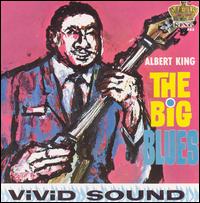Recording
The Big Blues compiles songs previously released as singles by Bobbin Records and King Records between 1959 and 1963. [1] King recorded "Blues at Sunrise" and "Let's Have a Natural Ball" for the St. Louis label Bobbin in 1960, [2] which helped to introduce him to a wider audience.
In October 1961, King released "Don't Throw Your Love on Me So Strong", which included Ike Turner on piano. [1] It did so well locally that King Records leased the record from Bobbin and released it as a single the next month. [3] It became King's first appearance on the charts, peaking at number 14 on the Billboard R&B chart. [4]
This page is based on this
Wikipedia article Text is available under the
CC BY-SA 4.0 license; additional terms may apply.
Images, videos and audio are available under their respective licenses.
